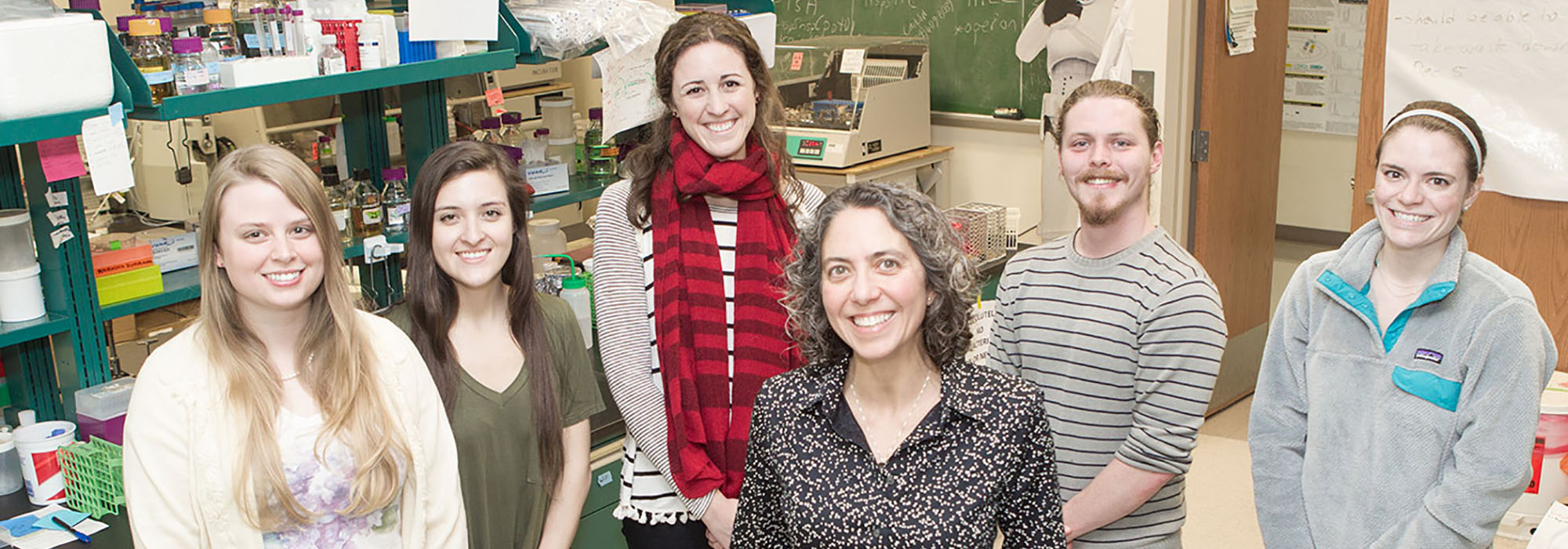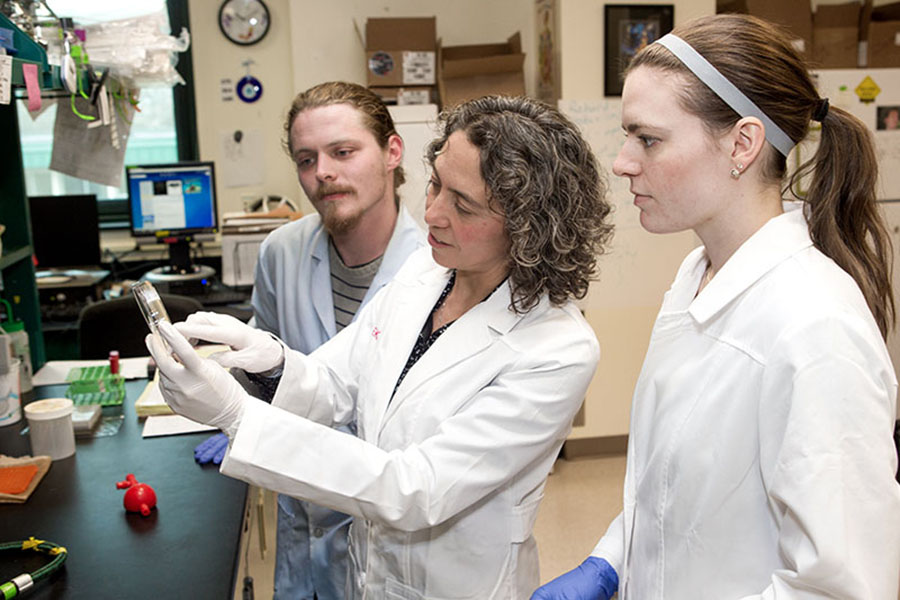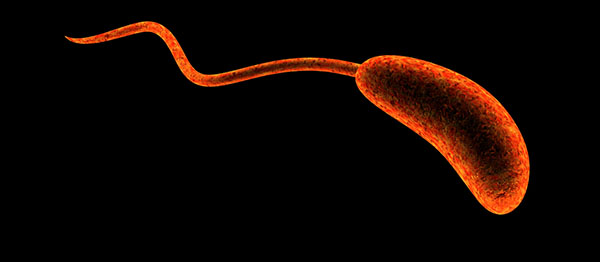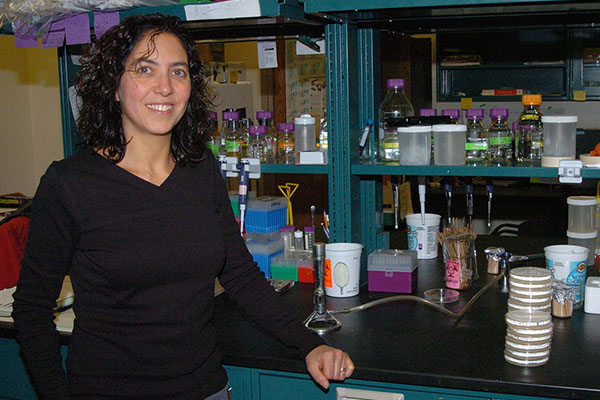Dr. Ece Karatan, an associate professor in the College of Arts and Sciences’ Department of Biology at Appalachian State University, has been awarded her second National Institutes of Health (NIH) grant for her research in cholera and microbial biofilms.
Her cholera research is fully funded for the next three years. Student mentoring, she said, is her true passion so “perhaps the best part is that I will be able to pay my students’ salaries. The grant will allow us to travel to national and regional conferences where the networking opportunities are huge. I also get funds for supplies.”
Molecular microbiology, she explained, “is very expensive, so the funds will allow us to purchase the supplies we need for the research. Finally, it buys me out of teaching one class per year and lets me spend more time on my research and mentoring the students in my lab.”
Asked how she qualified for the second round of funding, Karatan, who received her doctorate from the University of Illinois at Urbana-Champaign and her undergraduate degree from Bogazici University in Istanbul, Turkey, explained: “The NIH likes to see that you’ve trained lots of students” (18 graduate students over her 11 years at Appalachian, eight over the course of her first three years of funding); “that you are publishing (I managed to produce three good papers over the first funding period.); that the research is progressing, and that there is responsible fiscal oversight.”
‘Jell-o® with grapes in it’
Karatan’s research focuses on how Vibrio cholerae, the bacterium that causes cholera, forms biofilms. For a microscopic visual of biofilm, think slime or, in Karatan’s words, “Jell-o® with grapes in it – the Jell-o being the sticky material that surrounds the cells in the biofilm and the grapes, the cells.” Microbial biofilms are as common in nature as the microorganisms that cause them. Virtually any liquid environment can generate conditions for biofilm growth. Microorganisms in biofilms are protected from environmental stressors, so living in biofilms is advantageous for bacteria.
In lay terms, Karatan’s research indicates one of the proteins that regulates V. cholerae biofilm responds to external cues. In turn, that protein talks to a second protein that then cues the bacterium to make more biofilms. If she can interrupt or break the cycle, it’s possible she can prevent Vibrio cholerae from setting up in the intestines.
The chances of eliminating cholera, Karatan admitted, are on par with winning the lottery. “It’s really ultimately a sanitation issue,” she said. The money shot – what Karatan labels, albeit hesitantly, a “new paradigm” – is that it so happens that many different bacteria have genes that encode two proteins that look just like the ones she is studying, and no one has investigated any of them. “We can look at these bacterial genomes and predict bacterial signaling in all types of hosts and locations,” she said, “including arctic ice. We have a model system we know a lot about that can be applied in a host of other scenarios.”
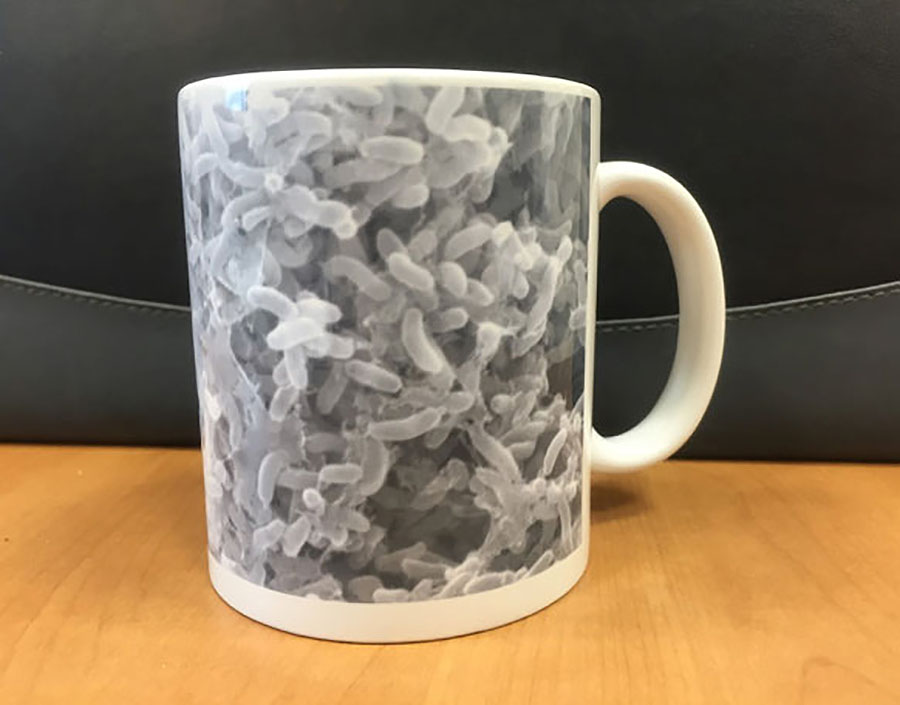
Karatan’s favorite mug was created by a former graduate student, Will Brennan ’15 MS, who scanned an electron microscopy image of one of his Vibrio cholerae biofilms. The elongated cylindrical structures are the bacteria and the stringy, sheet-like structure is the polysaccharide that the bacteria secrete to hold them together (think of it as molecular glue). Brennan also earned a bachelor’s degree in biology from Appalachian in 2012.
Student mentoring through research
As excited as she is about the research per se, Karatan became clearly more animated when she talked about her students. “Student mentoring just makes me happy. My lab is my sanctuary. I go to my lab and I talk to my students and it’s so exciting to be here. I love it,” she said. “I’ve had great students, that’s part of it. Sure, they do not come without challenges... but they have done, are doing, phenomenal work. They are hardworking and such fun to be around.”
Her research students appear to be devoted to her as well. In turns they described her as driven, caring, imaginative, creative, passionate and patient. They praised her for her hands-on interaction with their experiments and for encouraging them to think creatively and independently.
Former student Randy Cockerell ’13 MS, who recently returned to Appalachian in the full-time position as laboratory manager for molecular and microbiology, credited Karatan with helping him embrace failure. “As a molecular biology grad student,” he said, “you have to be okay with failure. She taught us to look at failure through a different light. An experiment not working is not failing but learning several ways to not do something. That’s a really valuable lesson.”
(Pronunciation guide for Ece: eh Jay)
What do you think?
Share your feedback on this story.
About the Department of Biology
The Department of Biology is a community of teacher-scholars, with faculty representing the full breadth of biological specializations — from molecular genetics to landscape/ecosystem ecology. The department seeks to produce graduates with sound scientific knowledge, the skills to create new knowledge, and the excitement and appreciation of scientific discovery. Learn more at https://biology.appstate.edu.
About the College of Arts and Sciences
The College of Arts and Sciences (CAS) at Appalachian State University is home to 17 academic departments, two centers and one residential college. These units span the humanities and the social, mathematical and natural sciences. CAS aims to develop a distinctive identity built upon our university's strengths, traditions and locations. The college’s values lie not only in service to the university and local community, but through inspiring, training, educating and sustaining the development of its students as global citizens. More than 6,800 student majors are enrolled in the college. As the college is also largely responsible for implementing App State’s general education curriculum, it is heavily involved in the education of all students at the university, including those pursuing majors in other colleges. Learn more at https://cas.appstate.edu.
About Appalachian State University
As a premier public institution, Appalachian State University prepares students to lead purposeful lives. App State is one of 17 campuses in the University of North Carolina System, with a national reputation for innovative teaching and opening access to a high-quality, cost-effective education. The university enrolls more than 21,000 students, has a low student-to-faculty ratio and offers more than 150 undergraduate and 80 graduate majors at its Boone and Hickory campuses and through App State Online. Learn more at https://www.appstate.edu.
